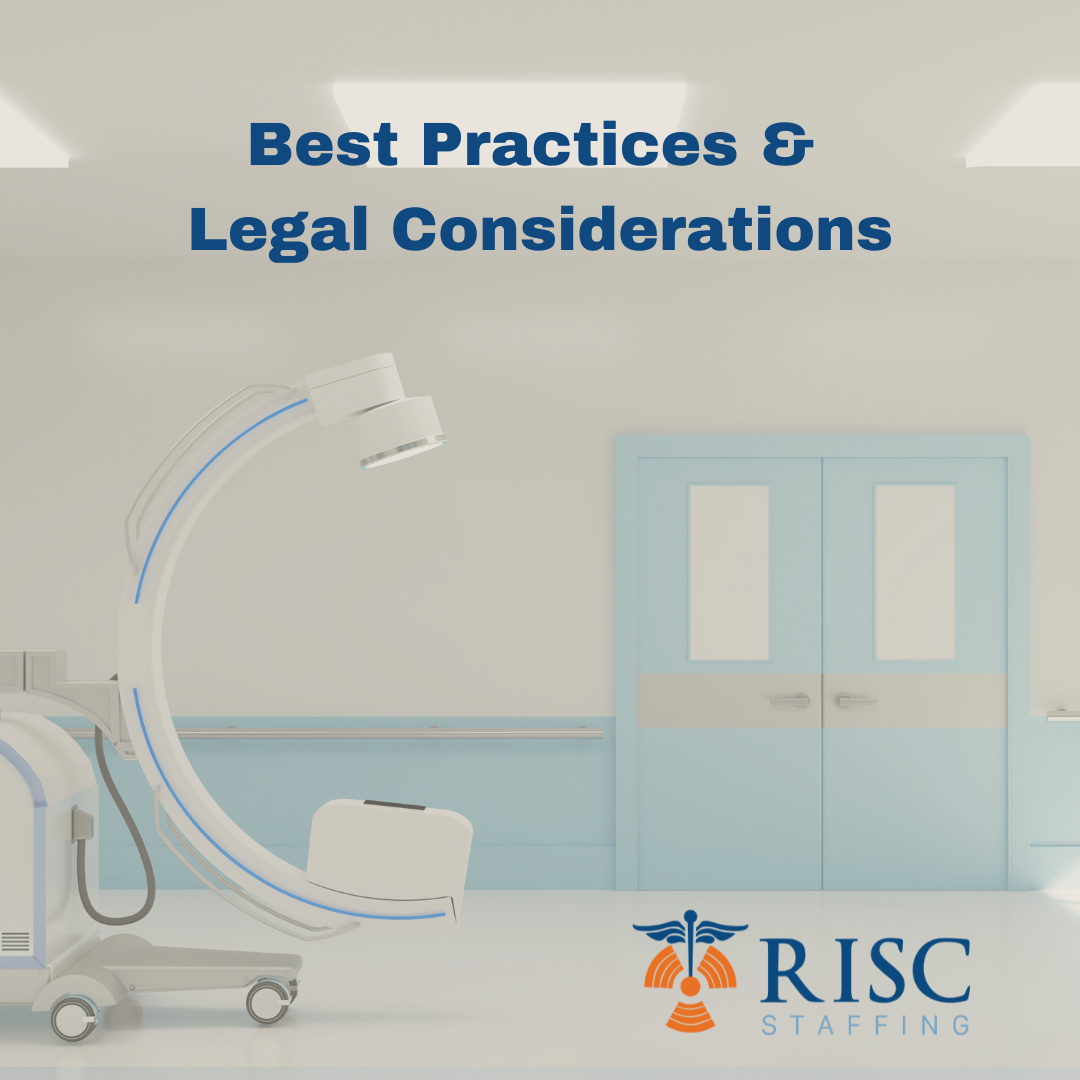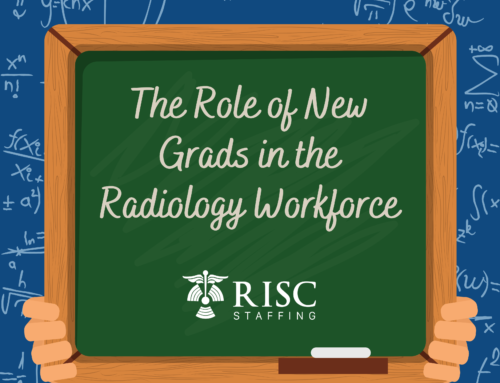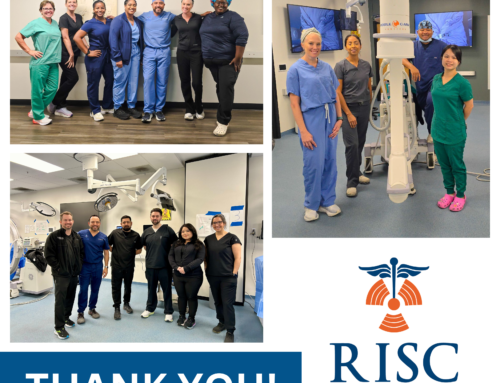Ensuring Compliance in Radiology Staffing: Best Practices and Legal Considerations
Navigating the complex landscape of compliance in radiology staffing is crucial for healthcare facilities to maintain high standards of patient care, avoid legal pitfalls, and ensure operational efficiency. Compliance in radiology staffing encompasses a variety of factors, including licensure, credentialing, and adherence to regulatory standards. This blog will explore best practices and legal considerations for ensuring compliance in radiology staffing and how RISC Staffing assists clients in maintaining compliance while streamlining staffing processes.
Understanding Compliance Requirements in Radiology Staffing
Licensure and Certification: Licensure is a fundamental requirement for radiologists and radiologic technologists. Each state has specific licensure requirements, which generally include passing a comprehensive exam and completing a certain amount of continuing education credits. Additionally, radiologists often need to be board-certified by entities such as the American Board of Radiology (ABR) to demonstrate their expertise in the field.
Credentialing: Credentialing is the process of verifying the qualifications and professional background of healthcare providers. This involves checking educational background, work experience, certifications, and malpractice history. Credentialing ensures that only qualified professionals are allowed to provide care, which is essential for patient safety and the facility’s reputation.
Regulatory Standards: Regulatory standards for radiology are established by various organizations, including The Joint Commission (TJC), the American College of Radiology (ACR), and the Centers for Medicare & Medicaid Services (CMS). These standards cover a wide range of practices, from radiation safety and equipment maintenance to patient privacy and documentation.
Best Practices for Ensuring Compliance
- Regular Training and Education:
- Continual education and training are critical in ensuring that radiology staff remain up-to-date with the latest technologies, techniques, and regulatory requirements. Facilities should invest in regular training programs and encourage staff to pursue continuing education opportunities.
- Comprehensive Credentialing Processes:
- Implementing a thorough credentialing process is essential. This includes primary source verification of licenses, certifications, and education. Regular re-credentialing should also be conducted to ensure ongoing compliance with current standards and regulations.
- Implementing Robust Policies and Procedures:
- Developing and maintaining detailed policies and procedures that address all aspects of radiology practice is vital. These should include protocols for patient safety, radiation protection, equipment use, and emergency procedures. Ensuring that all staff are familiar with and adhere to these policies helps maintain compliance.
- Utilizing Technology:
- Leveraging technology can significantly enhance compliance efforts. Credentialing software can streamline the verification process, while electronic health records (EHR) systems can help ensure proper documentation and adherence to patient privacy regulations.
- Regular Audits and Assessments:
- Conducting regular audits and assessments helps identify areas of non-compliance and opportunities for improvement. These audits should review both clinical practices and administrative processes to ensure comprehensive compliance.
Legal Considerations in Radiology Staffing
- Employment Laws:
- Healthcare facilities must adhere to federal and state employment laws, including those related to equal employment opportunity, workplace safety, and labor relations. Understanding and complying with these laws is essential to avoid legal disputes and foster a positive work environment.
- Contractual Agreements:
- Radiology staffing often involves contractual agreements between the facility and the staffing agency or individual radiologists. These contracts should clearly outline the responsibilities and expectations of both parties, including compliance with all relevant licensure, credentialing, and regulatory requirements.
- Privacy Laws:
- Compliance with privacy laws, such as the Health Insurance Portability and Accountability Act (HIPAA), is critical in radiology. Radiology staff must be trained to handle patient information securely and ensure that all data is protected from unauthorized access.
- Malpractice and Liability:
- Ensuring that all radiology staff are adequately covered by malpractice insurance is a key legal consideration. Facilities should also implement risk management strategies to minimize the potential for medical errors and associated liabilities.
How RISC Staffing Assists with Compliance
RISC Staffing specializes in providing radiology staffing solutions that prioritize compliance and operational efficiency. Here’s how RISC Staffing supports clients in maintaining compliance:
- Rigorous Screening and Credentialing:
- RISC Staffing employs a comprehensive screening and credentialing process for all candidates. This includes primary source verification of licenses, certifications, education, and work history. By ensuring that only highly qualified professionals are placed, RISC Staffing helps clients maintain high standards of care and compliance.
- Ongoing Education and Training:
- RISC Staffing provides access to continuous education and training resources for its staff. This ensures that all radiologists and technologists remain current with the latest industry developments and regulatory changes.
- Customized Staffing Solutions:
- Understanding that each facility has unique needs, RISC Staffing offers customized staffing solutions tailored to specific compliance requirements. This includes temporary, permanent, and locum tenens placements to ensure that facilities are always adequately staffed with qualified professionals.
- Compliance Support and Consultation:
- RISC Staffing offers compliance support and consultation services. Their experts work closely with clients to develop and implement compliance strategies, conduct audits, and provide guidance on best practices.
- Leveraging Technology:
- Utilizing advanced technology solutions, RISC Staffing streamlines the credentialing and staffing processes. Their systems ensure that all documentation is accurate, up-to-date, and easily accessible, facilitating seamless compliance management.
Ensuring compliance in radiology staffing is a multifaceted challenge that requires diligent attention to licensure, credentialing, and regulatory standards. By following best practices such as regular training, comprehensive credentialing, and utilizing technology, healthcare facilities can maintain high standards of patient care and avoid legal pitfalls. RISC Staffing plays a crucial role in assisting clients with compliance, offering rigorous screening, ongoing education, customized solutions, and expert consultation. By partnering with RISC Staffing, healthcare facilities can streamline their staffing processes while ensuring robust compliance with all relevant standards and regulations.






